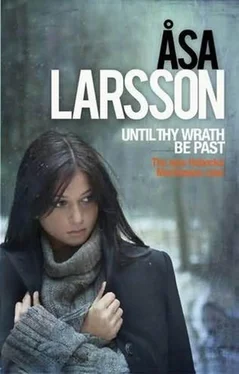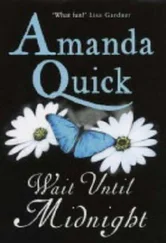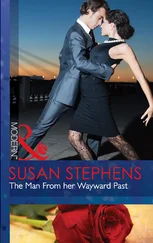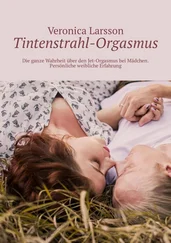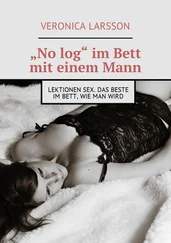Laura Krekula took her time before opening the door. She eyed the police officers standing outside. Mella could not resist flashing her I.D.
She could see the fear in Laura Krekula’s eyes. Rantakyrö and Olsson were wearing their serious faces.
I don’t feel sorry for her, Mella thought. How on earth could she marry such an idiot?
“Here you are again,” Laura said in a weak voice.
“We’re looking for Tore,” Mella said.
“He’s at work,” his wife said. “You won’t find him at home in the middle of the day.”
“Is that his car parked over there?” Mella said.
“Yes, but he’s making a delivery to Luleå today and won’t be back home until late tonight,” his wife said.
“Is it O.K. if we take a look round the house? One of the drivers at the garage said Tore was at home.”
Laura Krekula stepped to one side and let them in.
They opened wardrobes. Checked the garage and laundry room. Laura remained in the hall. After five minutes, the police thanked her and left.
When they had driven off, Laura went upstairs. She collected the big, long, hexagonal spanner that fitted the hatch to the cold loft. Turning the spanner, she let the hatch fall open and unfolded the ladder.
Tore Krekula climbed down.
Walking past his wife, he bounded down the stairs to the ground floor.
Laura followed him. Said nothing. Watched him pull on his boots and jacket. He went into the kitchen wearing his outdoor clothes. Spread some butter on the side of the crispbread with the deepest holes and cut some slices of sausage which he laid on top.
“Don’t say a thing,” he said with his mouth full. “Not a word to your mother or your sister. Is that clear?”
Hjalmar is skiing through the forest. The afternoon sun is warming everything. There are big balls of new snow in the trees, but it has started to melt and drip. I’m sitting in the birch trees among all the watery pearls, watching him. Moving from tree to tree. Being weightless, I can perch on the thinnest of twigs. In winter they are black and the frost makes them straggly. Now they’ve assumed a violet tinge. The colour of spring. I run like a lynx up a pine trunk smelling of resin. The bark is golden brown, just like Anni’s ginger biscuits. The branches are dressed in her green cable-knit cardigan. I hide inside the cardigan. Lying in wait for Hjalmar.
It must be at least twenty years since he last went skiing. His boots and skis are much older than that. Old-fashioned, untarred, unwaxed skis with ancient mousetrap bindings. He can’t make them slide. He has to keep stopping in order to scrape away the snow clinging onto the bottoms. He sinks down into the snow even though he is trying to follow the scooter tracks. His ungreased, cracked leather boots are soon soaked through. His trousers as well.
His poles sink into the snow. Deep down, and it’s hard work pulling them out again. The discs get stuck. When he manages to pull them up again they look like cylinders, with 30 centimetres of snow clinging to the poles above the discs.
He thinks he’s making wretchedly slow progress, but he wouldn’t have been able to progress at all without skis. And if skis like these were good enough for his father and his friends, why shouldn’t they be good enough for him? Don’t forget that in the old days the Lapps used to roam far and wide through the forests with much worse equipment and only one pole.
Occasionally he looks up. Sees drops of water trembling hesitantly on the branches.
Sweat runs down his forehead and makes his eyes smart.
At last he comes to the shelter he and Tore built twenty years ago just south of Ripukkavaara.
Hjalmar sits down in the shelter and takes the thermos of coffee and box of sandwiches from his rucksack. The sun warms his face.
Taking the sandwiches out of the plastic box, he is overcome by exhaustion. He puts them down beside him.
The wind sighs soothingly in the crowns of the trees. Like Anni’s wooden spoon in a pot. The branches sway from side to side, offering no resistance. Allow themselves to be rocked to sleep. Not long ago Hjalmar thought the birdsong was hurting his ears. It sounded like knives being sharpened by rubbing against each other. But now it sounds quite different. A chirping and chirruping. A woodpecker is hammering at a tree trunk in the distance.
Hjalmar lies down on his side. Water drips from the roof of the shelter.
A sentence comes into his mind: “Therefore is my spirit overwhelmed within me; my heart within me is desolate.” Where does it come from? Is it something he’s read in the Bible in his cottage at Saarisuanto?
Why should one have to worry about things that happened in the past? When his father held his head under the icy water. That was fifty years ago. He never thinks about it; why would he start now?
His eyes close. The snow sighs in the forest, made weary by the coming of spring. The sun is roasting hot. Hjalmar dozes off in the warmth of the shelter.
He is woken up by a presence. Opens his eyes and at first sees only a shadow blocking out the sun. Shaggy and black.
Like a shot he is wide awake. A bear.
It stands up on its hind legs in front of him. Hjalmar can make out more than the mere outline. Its snout, its fur. Its paws and claws. For three long seconds it stands still, staring him in the eye.
It’s curtains, Hjalmar thinks.
Three more seconds. During those three seconds, everything in Hjalmar comes to a standstill.
Well, this is it, he thinks about his own death.
God is looking at Hjalmar through the eye of the bear.
Then the bear turns round, flops down on all fours and ambles away.
Hjalmar’s heart starts pounding. It is the beating heart of life. It is the fingertips of the shaman on the skin of a drum. It is the rain on the tin roof of his cottage at Saarisuanto, an autumn evening when he’s lying in bed and the fire is crackling in the hearth.
His blood flows through his veins. It is the spring water starting to flow beneath the ice, forming rivulets under the snow, finding its way up into the trees, cascading over cliffs.
His breath floats in and out of his lungs. It is the wind that lifts up the rollicking raven, that whips the snow into whirling, sharp-edged spirals on the mountainside, that caresses the lake tenderly in the evening, and then lies down to rest and enables everything to become still and mirror-like.
My God, says Hjalmar in the absence of anybody else, anything else to turn to while he wallows in the feeling of deliverance that has overwhelmed him. Stay, stay with me.
But he knows this is a sensation that will not last. He sits still until it dies away.
Now he notices that his sandwiches are no longer there. They were what lured the bear to the shelter.
He skis home, feeling exhilarated.
Anything at all can happen now, he thinks. I’m free. The bear could have killed me. It could have been curtains.
He will search through the Bible in his cottage and see if he can find that line. “My heart within me is desolate.”
Anni looks completely transparent now. She’s been asleep on the kitchen sofa. I’m sitting next to her, looking at her chest. The muscles inside are so tired, there’s no strength left in them. Her breathing is shallow and fast. The spring sunshine pours in through the window and warms her legs. Then suddenly she opens her eyes.
“Shall we put the coffee on?” she says.
I realize that she’s talking to me, even though she can’t see me. Although she is far from certain that I’m there.
She sits up slowly: her left hand finds support behind her back while she holds onto the white-painted wooden back of the sofa with her right one. Then she needs to use both hands to move her legs closer to the edge of the sofa until they overlap it and she can lower them to the floor. Feet into her slippers, hand on the table to get some leverage. A little gasp reflecting effort and pain, and a there-we-go slides over her lips as she stands up.
Читать дальше
